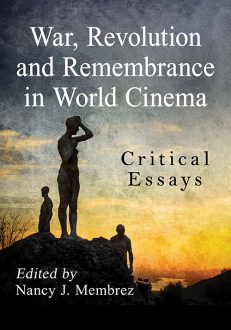War, Revolution and Remembrance in World Cinema
Critical Essays
Original price was: $65.00.$32.99Current price is: $32.99.
In stock
About the Book
Two World Wars engulfed Europe, Asia and the United States, leaving indelible scars on the landscape and survivors. The trauma of civil wars in Spain (declared) and Latin America (tacit) spanned decades yet, contradictorily, bind parties together even today. Civil wars still haunt Africa where, in more recent years, ethnic cleansing has led to wholesale genocide. Drawing on the emerging field of Memory Studies, this book examines narrative and documentary films, made far from Hollywood, that address memory—both traumatic and nostalgic—surrounding these conflicts, despite attempts by special interests to erase or manipulate history.
About the Author(s)
Bibliographic Details
Edited by Nancy J. Membrez
Format: softcover (7 x 10)
Pages: 358
Bibliographic Info: 67 photos, notes, bibliographies, index
Copyright Date: 2021
pISBN: 978-1-4766-7607-4
eISBN: 978-1-4766-4207-9
Imprint: McFarland
Table of Contents
Acknowledgments xi
Introduction: War and Remembrance in World Cinema
Nancy J. Membrez 1
Part I: Europe
Children of the Shoah: The Holocaust Through Youthful Lenses
Steven G. Kellman 8
Remembering Exile: Jews in the American Dystopia in Axel Corti’s Santa Fé
Christopher J. Wickham 17
The Past Trapped in Amber: Ida (Pawlikowski, 2013) à la mode retro
Ewa Barbara Luczak 26
Une Affaire de Femmes (Story of Women, Chabrol, 1988): Profile of an Abortionist Executed Under the Vichy Regime
Mary E. McCullough 37
Staging Childhood: Memories of Shattered Youth in Carlos Saura’s 1Ay, Carmela! (1990) and Emilio Aragón’s Pájaros de papel (Paper Birds, 2010)
María Elena Soliño 50
War and Social Positioning in El espinazo del diablo (The Devil’s Backbone) and El laberinto del fauno (Pan’s Labyrinth) (Del Toro, 2001, 2006): Between the Imaginary and the Self
Mónica Cantero-Exojo 67
El espíritu de la colmena (The Spirit of the Beehive, Erice, 1973) Revisited
Nancy J. Membrez 81
Memorama of Muerte de un ciclista (Death of a Cyclist, Bardem, 1955)
Nancy J. Membrez 106
Part II: Latin America
Olga (Monjardim, 2004): A Brazilian Film About a Holocaust Heroine-Martyr
Ann Helen Wainer 124
In Search of the Father: Forgetting and Autofiction in Two Argentine Documentaries: El (im)posible olvido (Impossible to Forget, Habegger, 2016) and El padre (The Father, Arruti, 2016)
Natalia Ruiz-Rubio, translated by Nancy J. Membrez 135
The Burden of Violence in Ciro Guerra’s La sombra del caminante (Wandering Shadows, 2004)
Rebecca Stephanis 150
The Centenary of the Mexican Revolution on Film: Salvador Toscano and a Host of Others
Aurelio de los Reyes, translated by Nancy J. Membrez 167
Colonial Legacy: The Roots of Raíces (Alazraki, 1953)
Nancy J. Membrez 182
The Mexican Revolution Reloaded: Este es mi reino (This Is My Kingdom, 2010), a Short Film by Carlos Reygadas
Sebastião Guilherme Albano, translated by Nancy J. Membrez 203
From Havana Back to the Source: The Decaying City as a Character in the Films of the Cuban Revolution
Hugo García González, translated by Nancy J. Membrez 216
The 60th Anniversary of Parallel Worlds: Cuban Cinema Since the Revolution
Nancy J. Membrez 239
Part III: Africa
Remembrance or Revenge? Representations of Violent Death in Fanta Régina Nacro’s The Night of Truth (2004) and Wanuri Kahiu’s From a Whisper (2008)
Joya F. Uraïzee 272
Never Again! Documenting and Remembering the Rwanda Genocide (1994) on Film
Antoinette F. Winstead 284
Part IV: Interviews
An Interview with the Director of the Cineteca Nacional de México (National Cinemateque of Mexico)
Sebastião Guilherme Albano, translated by Nancy J. Membrez 296
A Chat with Brazilian Screenwriter-Director Lúcia Murat About Violence in Her Films
Sebastião Guilherme Albano, translated by Nancy J. Membrez 301
The Importance of Historical Memory: An Interview with Spanish Film Director and Cinematographer Almudena Carracedo
Nancy J. Membrez 307
About the Contributors 321
Index 323





